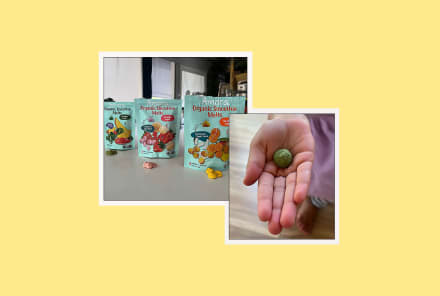Advertisement
Should Kids Come First? Why Prioritizing Your Relationship Benefits The Whole Family


When a new couple reaches out to me for counseling, time and time again, it quickly comes to light how their marital problems stem from this repeated proclamation: "Well, the kids have always come first."
Now, here they sit on the counseling couch, sometimes mired in conflict or even broken from betrayal, starving for the love and friendship they once had. At least one of the partners typically confesses how putting the kids first still feels right, that they are simply bad parents unless their world revolves around their children.
Should kids come first?
Having children is a life dream for so many, and for obvious reasons. Yet there is no denying that these tiny, utterly dependent beings instantly place the parents' relationship on the back burner—as they should. It's such a blessing to become a parent, yet after this transition from duo to trio, many couples find it difficult to protect and restore their one-on-one bond.
I am always eager to address the who-should-come-first topic with couples because I see, day in and day out, how misguided so many good people are regarding their priorities in the family dynamic. My husband and I were one such misguided couple. In the earlier years of parenthood, I fell especially hard into the "kids come first" mindset, and my husband doubled down with me. We focused on our children to such a degree that our marriage was waning and our kids weren't thriving to the degree we wished for them.
When they were 11 and 8 years old, my husband and I took a parenting class that turned our priorities literally upside down. What we learned shocked us yet instantly resonated. The recommended order of priority went like this:
- Self
- Marriage
- Kids
At first pass, this order of priority might feel uncomfortable or sound neglectful. Please be assured that, of course, children require and deserve a tremendous amount of love and care. At times, their needs will and should override any other priority. Nevertheless, when we take a look at the bigger picture—and the logic—this suggested priority holds its weight, both energetically and scientifically.
The ripple effects of prioritizing your relationship.
When we invest in our Self—that is, in our growth, happiness, and purpose—we feel energized, which provides us with more to give to our relationship. In turn, as we invest (constantly) in our Marriage, keeping our friendship and connection strong, this loving energy flows to our Kids directly through us.
Taking this idea a little deeper, according to the wisdom of Kabbalah, children and their parents share a soul-to-soul connection. As parents grow their unity and love together, the effect is quantum—their children benefit directly from this energy.
Furthermore, research1 strongly suggests that children are happier and more secure when raised by parents whose love for each other is strong compared to those raised in a loveless or conflictual environment. Children can sense when there is discord between parents, and unfortunately, they tend to take responsibility for their parents' distress and unhappiness.
Relationship researcher John Gottman, Ph.D., has observed how the stronger the relationship, the greater the benefit to the children. Happier couples are also happier people. Anyone who is a parent can appreciate how much better we all show up for our kids when we are in a good place.
In our own family dynamic—through simple yet effortful changes—my husband and I saw for ourselves that sometimes good parenting meant putting our relationship first. This often felt counterintuitive, especially for me, but this new approach wouldn't have worked so well if only one of us were on board for making each other more of a priority.
By allowing our energy to flow from Self → to Marriage → to Kids, we were not only happier and less exhausted, but we watched our daughter and son become more empowered and confident. They also approached us with more kindness and appreciation. While our relationship is always a work in progress, we both agree that our priority pivot helped us provide a more stable foundation for our kids and a better example for lasting love.
Fighting for our relationship.
We often live by an illusionary perception—that a marriage should run itself, give to us like we are the customer. We must ask ourselves, especially if we are feeling unfulfilled, "Am I treating my partner as the most important other person in my life?" (This priority falls under pillar three in what I have come to identify as the Four Pillars to Lasting Love.)
We tend to make our beloved a priority in the beginning. However, once the enchantment phase passes, and if we are fortunate to have children, it becomes all too easy to pass right by our partner and focus on the kids. This can be especially true for the mothering parent, as women are often raised to be nurturers, and this desire to take care of someone naturally moves to the children. My mother was told something, though, when her first child was born that may sound old-fashioned, but I have found it truly timeless: "Remember, your spouse came first."
A check-in questionnaire for couples with kids.
Placing our partner as our No. 1, and making sure they know this, is essential to maintain and deepen our original love. My hope is that it's more clear to see that loving our partner fiercely is one of the best things we can do for our children.
Feel free to answer the questions below with "true" or "false." This can help you think about the ways you make your partner a priority and where you might want to try something new—in your thoughts, words, and actions.
Each couple is unique and has its own unique circumstances, so tailor these to what making each other a priority looks like for you:
- I know very well what makes my partner feel like the No. 1 priority in my life.
- I make sure to check in with my partner to be sure they are happy.
- Though it's OK to disagree about parenting, I don't openly disagree with my partner in front of the kids.
- In my personal life, I spend more time interacting with my partner than anyone else.
- If I'm with my partner and someone else calls, I usually don't take the call.
- When something significant happens in my life, my partner is almost always the first person I want to share it with.
- When I go out with my partner without the kids, I don't have guilt in my voice when I tell them because I know that it's best for them for us to have time together.
- My partner and I have personal and authentic conversations regularly.
- When my partner wants to show me something or tell me something, I give them my attention even if I am in the middle of something else.
- My children feel loved and like a priority, but they also know they do not come before my partner.
- I don't let my child play one parent against the other; we stay a united team in our parenting.
- I rarely change plans I've made with my partner because the kids want something that interferes.
- My partner and I take an adult vacation at least once a year.
- Our kids don't assume they can interrupt us when my partner and I are having a conversation. It's expected that they might need to wait.
- Throughout my week, I go out of my way to do things unnecessary that I know make my partner feel loved.
- My partner and I have a private date night at least two to three times a month.
- My partner and I seek out and nourish our common interests and personal dreams that don't necessarily center around the kids.
- We put time into growing personally and in our marriage. That might include reading books, listening to podcasts, or seeing a marriage counselor and/or spiritual mentor.
The takeaway.
Love does not divide like a pie with less and less to go around as we share it. Love multiplies. Give yourself permission to take better care of yourself and your relationship. The benefit will surely expand into the rest of your family, yet all that aside, you are worth it.
Watch Next
Enjoy some of our favorite clips from classes
Enjoy some of our favorite clips from classes
What Is Meditation?
Mindfulness/Spirituality | Light Watkins
Box Breathing
Mindfulness/Spirituality | Gwen Dittmar
What Breathwork Can Address
Mindfulness/Spirituality | Gwen Dittmar
The 8 Limbs of Yoga - What is Asana?
Yoga | Caley Alyssa
Two Standing Postures to Open Up Tight Hips
Yoga | Caley Alyssa
How Plants Can Optimize Athletic Performance
Nutrition | Rich Roll
What to Eat Before a Workout
Nutrition | Rich Roll
How Ayurveda Helps Us Navigate Modern Life
Nutrition | Sahara Rose
Messages About Love & Relationships
Love & Relationships | Esther Perel
Love Languages
Love & Relationships | Esther Perel
What Is Meditation?
Box Breathing
What Breathwork Can Address
The 8 Limbs of Yoga - What is Asana?
Two Standing Postures to Open Up Tight Hips
How Plants Can Optimize Athletic Performance
What to Eat Before a Workout
How Ayurveda Helps Us Navigate Modern Life
Messages About Love & Relationships
Love Languages
Advertisement

I'm A Couples' Counselor & This Is The No. 1 Activity For A Lasting Relationship
Rachel Glik, Ed.D., LPC

I'm A Couples' Counselor & This Is The No. 1 Activity For A Lasting Relationship
Rachel Glik, Ed.D., LPC









